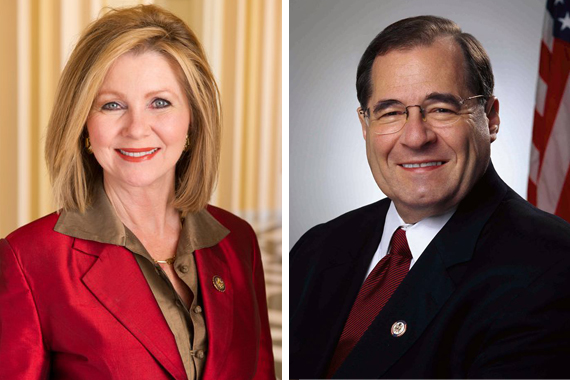

Pictured (L-R): Marsha Blackburn, Jerrold Nadler
Congressman Jerrold Nadler (D-NY), Ranking Member of the House Judiciary Subcommittee on Courts, Intellectual Property and the Internet, and Congresswoman Marsha Blackburn (R-TN), Chair of the Energy and Commerce Subcommittee on Communications and Technology, along with Judiciary Committee Ranking Member John Conyers, Jr. (D-MI), Chairman of the House Judiciary Subcommittee on Courts, Intellectual Property, and the Internet, Congressman Darrell Issa (R-CA), Judiciary Committee Member Congressman Ted Deutch (D-FL), and Congressman Tom Rooney (R-FL) have re-introduced the Fair Play Fair Pay Act, a bipartisan bill to create a uniform system of governing rules for music licensing for digital and terrestrial radio broadcasts.
A few of the things the bill would help ensure include:
- Creating a terrestrial performance right so that AM/FM radio competes on equal footing with its Internet and satellite competitors who already pay performance royalties. This would resolve the decades old struggle for performance rights and ensure that—for the first time—music creators would have the right to fair pay when their performances are broadcast on AM/FM radio.
- Bringing true platform parity to radio so that all forms of radio, regardless of the technology they use, pay fair market value for music performances. This levels the playing field and ends the unfair and illogical distortions caused by the different royalty standards that exist today.
- Ensuring terrestrial royalties are affordable capping royalties for stations with less than $1 million in annual revenue at $500 per year (and at $100 a year for non-commercial stations), while protecting religious and incidental uses of music from having to pay any royalties at all.
- Making a clear statement that pre-1972 recordings have value and those who are profiting from them must pay appropriate royalties for their use, while closely monitoring the litigation developments on this issue.
- Protecting songwriters and publishers by clearly stating that nothing in this bill can be used to lower songwriting royalties.
- Codifying industry practices streamlining the allocation of royalty payments to music producers.
- Ensuring that artists receive their fair share from direct licensing of all performances eligible for the statutory license.
“Our current music licensing laws are antiquated and unfair, which is why we need a system that ensures all radio services play by the same rules and all artists are fairly compensated,” said representatives Nadler, Blackburn, Conyers, Issa, Deutch and Rooney. “Our laws should reward innovation, spur economic diversity and uphold the constitutional rights of creators. That is what the Fair Play Fair Pay Act sets out to accomplish: fixing a system that for too long has disadvantaged music creators and pitted technologies against each other by allowing certain services to get away with paying little or nothing to artists.”

Category: Featured
About the Author
Hollabaugh, a staff writer at MusicRow magazine, has over 20 years of music business experience and has written for publications including American Profile, CMA Close Up, Nashville Arts And Entertainment, The Boot and Country Weekly. She has a Broadcast Journalism and Speech Communication degree from Texas Christian University, (go Horned Frogs), and welcomes your feedback or story ideas at lhollabaugh@musicrow.com.View Author Profile


